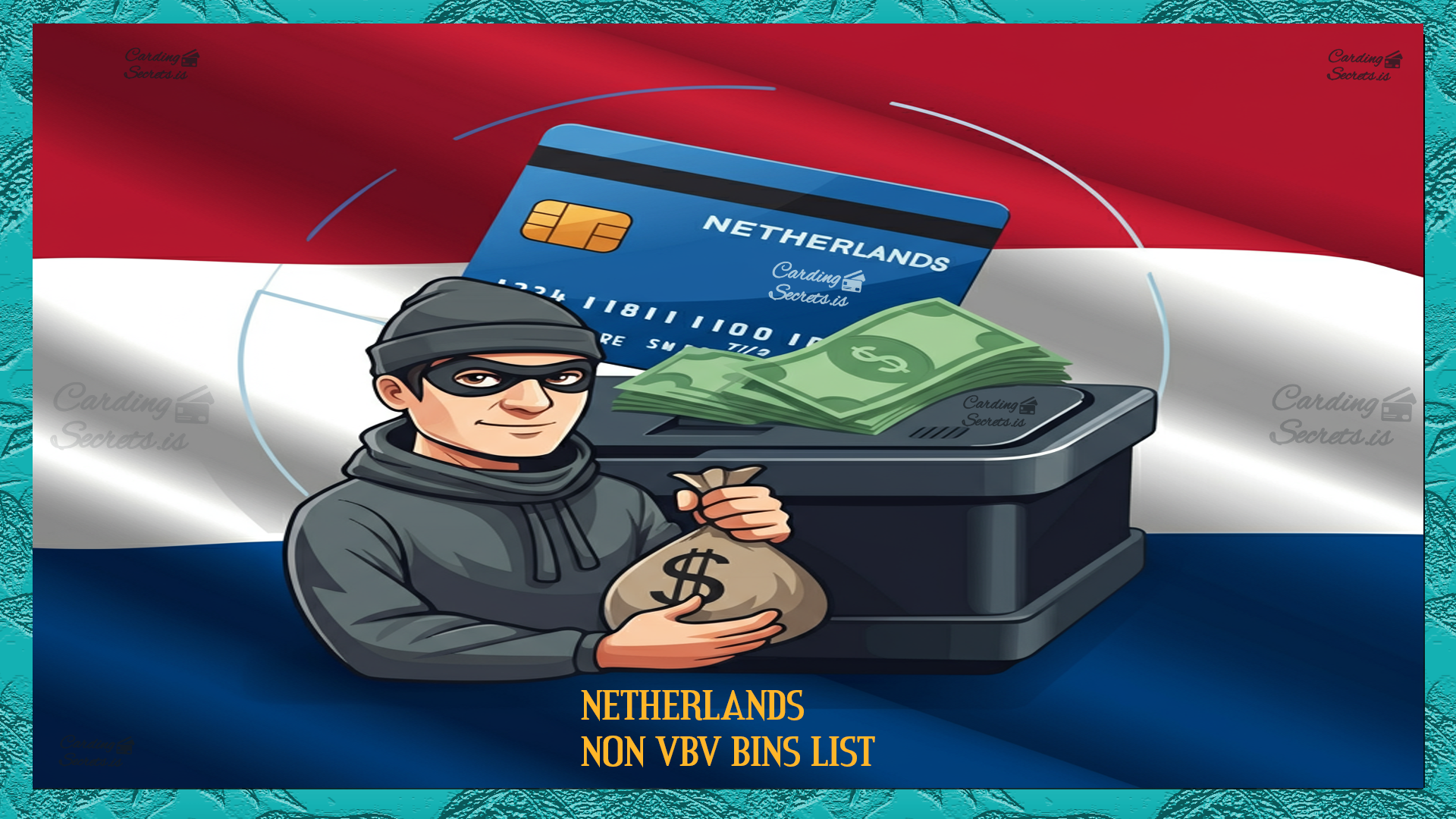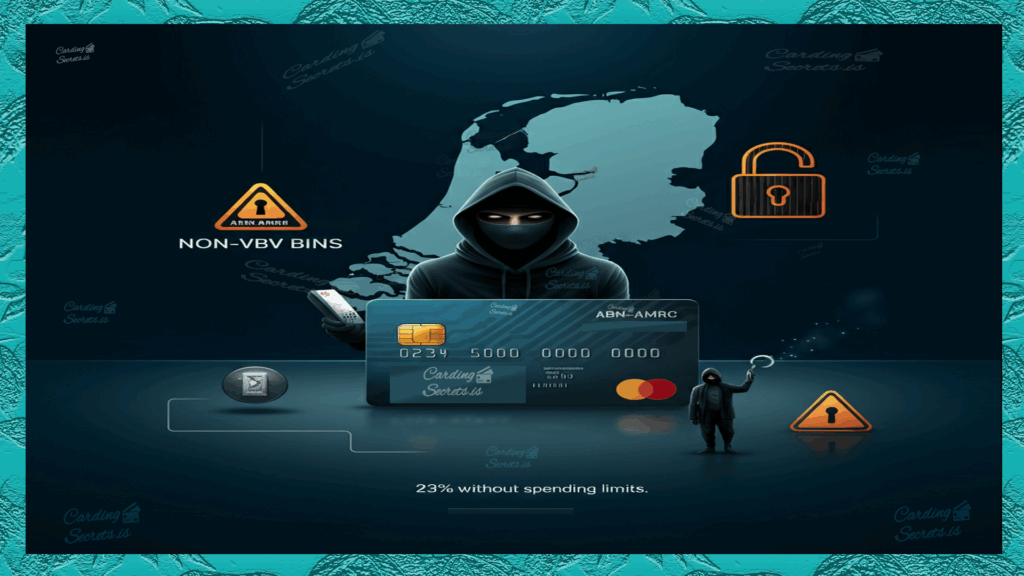
Discover the Netherlands non VBV BINs List, the vulnerabilities, and how non vbv bins can attract fraud. Learn key steps to improve your carding skills and make unauthorized transactions.
non VBV BINs List for the Netherlands
Below, we’ve compiled a list of for the Netherlands non-VBV BINs. This insight is critical in understanding how gaps in security measures can make these cards more appealing for fraudulent activities such as carding.
| BIN | Card Type | Card Category | Card Level | Issuer |
|---|---|---|---|---|
| 477258 | VISA | CREDIT | GOLD | PAYSQUARE B.V. |
| 477257 | VISA | CREDIT | CLASSIC | PAYSQUARE B.V. |
| 476024 | VISA | CREDIT | CLASSIC | POSTBANK, N.V. |
| 474131 | VISA | CREDIT | CLASSIC | ABN AMRO BANK, N.V. |
| 472906 | VISA | DEBIT | PREPAID | ABN AMRO BANK, N.V. |
| 472330 | VISA | DEBIT | PREPAID TRAVEL MONEY | INLUX (NETHERLANDS) BV |
| 456355 | VISA | CREDIT | BUSINESS | INTERNATIONAL CARD SERVICES B.V. |
| 456354 | VISA | CREDIT | CLASSIC | INTERNATIONAL CARD SERVICES B.V. |
| 422060 | VISA | CREDIT | PLATINUM | ING BANK |
| 512668 | MASTERCARD | CREDIT | STANDARD | INTERNATIONAL CARD SERVICES BV |
| 512494 | MASTERCARD | CREDIT | STANDARD | INTERNATIONAL CARD SERVICES BV |
| 510029 | MASTERCARD | CREDIT | GOLD | INTERNATIONAL CARD SERVICES BV |
| 510008 | MASTERCARD | CREDIT | CLASSIC | INTERNATIONAL CARD SERVICES BV |
| 534126 | MASTERCARD | CREDIT | GOLD | INTERNATIONAL CARD SERVICES BV |
| 532965 | MASTERCARD | CREDIT | CORPORATE | ING BANK N.V. |
| 532964 | MASTERCARD | CREDIT | CORPORATE | ING BANK N.V. |
| 530952 | MASTERCARD | CREDIT | GOLD | RABOBANK |
| 530836 | MASTERCARD | DEBIT | PREPAID | R. RAPHAEL AND SONS PLC |
| 530401 | MASTERCARD | CREDIT | WORLD | INTERNATIONAL CARD SERVICES BV |
| 523636 | MASTERCARD | CREDIT | CORPORATE | ING BANK N.V. |
| 523635 | MASTERCARD | CREDIT | CORPORATE | ING BANK N.V. |
| 522078 | MASTERCARD | CREDIT | STANDARD | INTERNATIONAL CARD SERVICES BV |
| 520953 | MASTERCARD | CREDIT | STANDARD | COOPERATIEVE RABOBANK U.A. |
| 552885 | MASTERCARD | CREDIT | BUSINESS | ABN AMRO BANK N.V |
| 552769 | MASTERCARD | CREDIT | CORPORATE | LUFTHANSA AIRPLUS SERVICEKARTEN GMBH |
| 541330 | MASTERCARD | CREDIT | STANDARD | EQUENS NEDERLAND B.V. |
| 540876 | MASTERCARD | CREDIT | GOLD | ABN AMRO BANK N.V |
| 671259 | MAESTRO | DEBIT | STANDARD | SANTANDER CONSUMER FINANCE BENELUX B.V. |
| 671188 | MAESTRO | DEBIT | STANDARD | ABN AMRO BANK N.V |
| 671160 | MAESTRO | DEBIT | STANDARD | BUNQ B.V. |
| 671156 | MAESTRO | DEBIT | STANDARD | SVENSKA HANDELSBANKEN AB |
Why Are These BINs a Prime Target?
The appeal of non VBV BINs lies in their lack of additional verification steps, which makes them easier to exploit for unauthorized transactions. With minimal security layers, transactions are often processed without alerting the cardholder or requiring additional authentication. Fraudsters often use these cards to make high-value purchases or drain large sums of money from an account in a matter of minutes.
Gaps in Financial Security Highlighted by ABN AMRO
Supporting this vulnerability, recent findings from a survey commissioned by ABN AMRO bring attention to how a significant portion of Dutch citizens leave themselves open to exploitation. Nearly 23% of respondents admitted they do not set daily spending limits for their debit cards or current accounts, essentially handing scammers a blank check to work with. Although 72% of Dutch citizens express concern about online scams, there’s a clear gap between awareness and action.

Cards without spending limits become especially lucrative when combined with non-VBV vulnerabilities. Fraudsters can act quickly, making unauthorized purchases or transfers with little fear of detection. While daily limits are an easily actionable safeguard, many users fail to implement them despite their utility in reducing fraud risks.
A Complementary Note on Security
ABN AMRO’s proactive approach, which includes awareness campaigns and encouraging the use of tools like spending limits and payment alerts, is helping address these gaps. Of those who set limits, 80% reported feeling safer. This suggests that small changes in financial behavior can lead to significant improvements in security. While initiatives like this are crucial, the use of non-VBV cards will remain a strong allure for fraudsters unless both institutions and individuals adopt stricter security measures.
Final Thoughts
The list of non VBV BINs for the Netherlands underscores the vulnerabilities that fraudsters exploit. While the cards themselves lack certain security features, the problem is magnified by user habits, such as failing to set daily spending limits or relying too heavily on built-in fraud protection.
To combat these challenges, individuals can take small yet impactful steps like enabling transaction alerts and applying spending caps. Banks and policymakers must also continue educating customers on the importance of proactive measures while improving card security standards. Together, these efforts can help mitigate the risks associated with non-VBV cards and create a safer financial environment for all.
Explore the Latest Worldwide Non VBV BINs Lists (Post)

Upgrade your carding game with our extensive Worldwide Non VBV BINs List, meticulously tested on over 300 carding methods. Say goodbye to frustrating 2-factor authentication SMS requests and address/ID verification pop-ups, and enjoy smooth, secure transactions across the globe. Our Non VBV BINs Lists are the ultimate tool for both beginners and experienced carders alike, ensuring you stay ahead of the competition. Don't let verification hurdles hold you back any longer - elevate your carding game with our top-of-the-line Worldwide Non VBV BINs List today!
These Non VBV BINs work on every cardable site!










